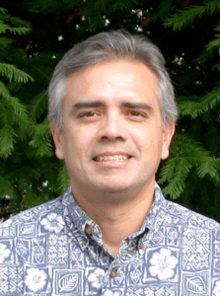James Zachos

Residence: Santa Cruz, California
Alma mater:
B.S. 1981 State University of New York, Oneonta
M.S. 1983 University of South Carolina
Ph.D 1988 University of Rhode Island, Graduate School of Oceanography
Institutions: University of California, Santa Cruz
Department of Earth and Planetary Sciences
Institute of Marine Science
Fields: Paleoceanography, paleoclimatology, marine stratigraphy
Known for: Cenozoic Paleoceanography, Geochemistry
James Zachos is an American paleoclimatologist, oceanographer, and marine scientist. He is currently a professor and chair at Department of Earth and Planetary sciences at University of California, Santa Cruz where he was elected to the National Academy of Sciences in 2017.[1][2]. He has conducted research on a wide variety of topics related to biological, chemical, and climatic evolution of late Cretaceous and Cenozoic oceans, and he is recognized for transforming our understanding of long-term climate change and climate transitions in the past 65 million years [3]. His investigation of past climatic condition aims to improve our ability to understand the consequences of carbon emission on climate change in the future [4].
Professor Zachos has been invited to give over 140 lectures and talks on his research at many institutions, universities, and conferences around the world, including Stanford University, University of Cambridge, and Utrecht University, University of Sao Paolo, and International Conference on Paleoceanography VIII [5]. He also took part in various Ocean Drilling Program (ODP) Expeditions to Antarctica and Southern Ocean. In the 2004 expedition, Zachos served as the co-chief scientist in Leg 208 to the south Atlantic [6].
Zachos is a fellow of the Geological Society of America, American Academy of Arts and Sciences, and American Geophysical Union. In 2016, he received the Milutin Milankovic Medal by the European Geosciences Union, which is awarded to scientists for their outstanding research in long-term climatic changes and modelling[7]
Research
James Zachos’ main interests are to understand the biological, chemical, and climatic changes of the late Cretaceous and Cenozoic oceans, over the last 65 million years ago [8]. This is established by investigating and measuring the chemical composition of shells from marine sediments to reconstruct models of past ocean composition, temperatures, continental ice-volume, circulation, productivity, and carbon cycling[9] . Through these models, it can be used to determine the mechanisms responsible for the long and short-term changes in current global climate. Presently, Zachos’ team is studying the mechanisms behind the rapid and extreme climate transition. His research tools consist of application of stable isotope and trace metal ratios in order to establish climatic events, Paleocene-Eocene Thermal Maximum[10] .
Academic Background
In 1981 State University of New York, Oneonta awarded Zachos his bachelor’s degrees in Geology and Economics [11] . Zachos obtained his M.S. in Geology (1983) at The University of South Carolina and a Ph.D. in Geological oceanography at the University of Rhode Island. After completed his education, he pursued a postdoctoral fellowship at University of Michigan from 1988 to 1990 before joining the faculty at Department of Earth and Planetary Sciences UC Santa Cruz in 1992.
Recognition
- Milutin Milankovic Medal, European Geosciences Union (2016)
- Highly Cited Researcher ESI (2014)
- Chauncey D. Holmes Lecture, Syracuse University (2014)
- Distinguished Achievement Award, University Rhode Island (2011)
- Fellow, California Academy of Sciences (2011)
- Fellow, American Academy of Arts and Sciences (2011)
- Humboldt Research Award (2008)
- USSSP Distinguished Lecturer (2007)
- Emiliani Lecture, American Geophysical Union (2006)
- CIRES Distinguished Lecture, University of Colorado (2005)
- Henry Charnovk Lecture, Southampton University (2004)
- Fellow, Bremen University Visiting (2004)
- Fellow, Geological Society of America (2004)
- Vetlesen Distinguishing Lecture, University of Rhode Island (2004)
- Visiting Fellow, University of Cambridge (2000)
- National Young Investigator (1994)
- JOI-USSAC Distinguished Lecturer (1993)
- Member, National Academy of Sciences
References
- ↑ https://news.ucsc.edu/2017/05/zachos-national-academy.html
- ↑ Stephens, Tim. “Climate scientist James Zachos elected to National Academy of Sciences”. UC Santa Cruz Newscenter. 2017-05-02.
- ↑ University of California, Santa Cruz. eps.ucsc.edu.
- ↑ Nyack, Al. “Ocean Acidification in Earth’s Past: Insights to the Future”. Metcalf Institute for Marine & Environmental Reporting. Retrieved 2018-02-08.
- ↑ UC Santa Cruz. websites.pmc.ucsc.edu
- ↑ Ocean Discovery Program. “A Rapid Rise in Greenhouse Gas Concentrations 55 Million Years Ago: A Deep-Sea Perspective on the Causes and Consequences”. Retrieved 2018-02-08.
- ↑ European Geosciences Union. MILUTIN MILANKOVIC MEDAL. 2016. Retrieved 2018-02-06
- ↑ Underwood, Time. “Zachos of UC Santa Cruz Speaks About Climate Change Jan. 25. Furman University News. 2018-01-12.
- ↑ University of California, Santa Cruz. eps.ucsc.edu
- ↑ Yale University. “Paleocene/Eocene Thermal Maximum”. The People of Geology & Geophysics . Retrieved 2018-02-08.
- ↑ Stephens, Tim. “Earth scientist James Zachos elected fellow of the American Geophysical Union”. UC Santa Cruz Newscenter. Retrieved 2008-02-14.